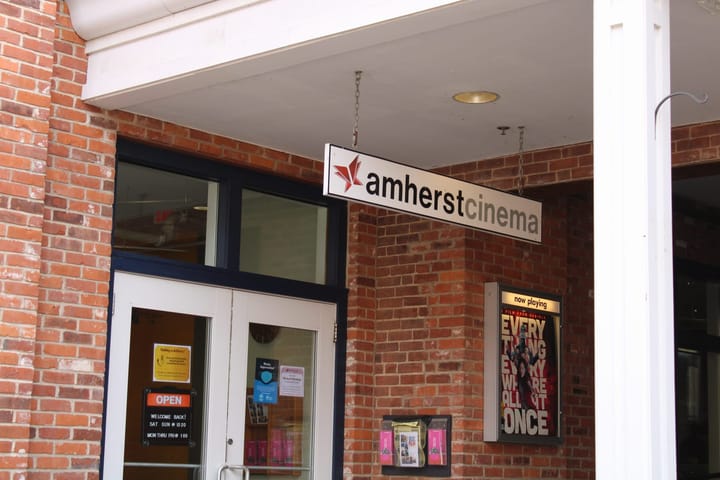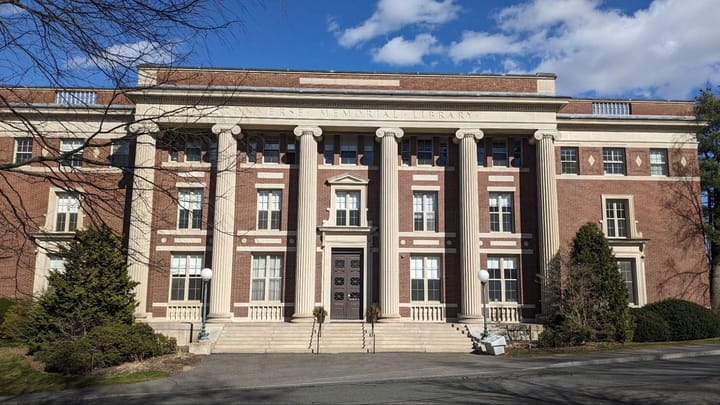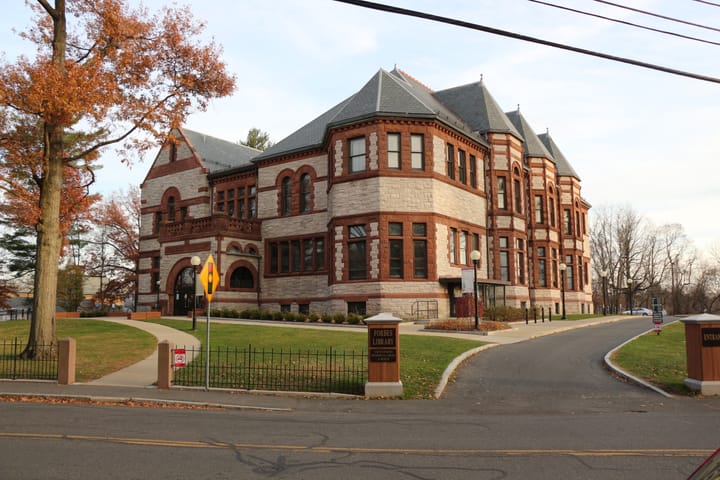From the Red Room: April 11 AAS Meeting Updates
The Association of Amherst Students (AAS) met for the ninth time this semester on Monday, April 11. The meeting agenda included swearing in the newly elected executive board, a public comment, and a lengthy discussion of next steps after the April 4 bylaw that instituted salaries for AAS officials.
On Monday, April 11, the Association of Amherst Students (AAS) met for the ninth time this semester. The meeting was held in the Red Room, and its agenda included swearing in the newly elected executive board, a public comment, and on-campus check-ins — which included a lengthy discussion of next steps after the April 4 bylaw that instituted salaries for AAS officials.
After attendance was taken, the newly elected executive board members were sworn in. President-Elect Sirus Wheaton ’23, Vice-President-Elect Jaden Richards ’25, Treasurer-Elect Dania Hallak ’24, and Secretary-Elect Jeffrey Ma ’24 recited the executive branch oath in unison, and officially assumed their positions. Then, Judiciary Council Chair-Elect Alex Jabor ’23 recited the judiciary branch oath by himself, and officially assumed his position.
The Senate then heard a public comment from Sophia Harrison ’22, who sought AAS support for the efforts of Amherst Community Connections (ACC), a local organization that works with individuals experiencing homelesness in town, to help them secure long-term housing. She asked whether the AAS would sign and disseminate a petition to the student body to have the college donate a parcel of land to ACC for the construction of an affordable housing unit. After asking several clarifying questions, the Senate agreed to vote on it over GroupMe after reviewing the petition outside of the meeting.
Then, after approving the previous week’s minutes, the Senate reviewed the Budgetary Committee (BC) discretionary funding recommendations and Senate project funding requests. Hallak presented the BC recommendations, with the largest requests coming from WAMH, women’s ultimate frisbee, and men’s ultimate frisbee. The recommendations totaled $14,178.58.
Sophie Sweeney ’23 requested $3,000 to buy plants for her campus garden Senate project, and Fareeda Adejumo ’23 requested $1,000 to provide food across three days during the reading period. Both the BC-recommended total and the two Senate project funding requests were jointly approved in a Senate vote.
During the officer reports section of the meeting, Sofia Guerra ’22 reported on her meeting with Chief of Police John Carter about campus safety concerns. The meeting primarily focused on the unmarking of Amherst College Police Department (ACPD) cars, delays in the arrival of requested Safe R-I-D-E cars, and adding more lights around campus. According to Guerra, Carter expressed regret for making the decision to unmark the ACPD cars without first asking students and said that the decals will be returned to the cars.
Carter said that he was unaware that Safe R-I-D-E had been experiencing widespread delays. He advised that students whose car does not arrive should continue to call back every 10 minutes that the car is still not there. This, he said, ensures that there is a record of which drivers are not making it on time. He is also considering introducing an app to facilitate the Safe R-I-D-E experience.
Regarding the potential addition of lights around campus, Carter said that he is working with a contractor to add lighting to nearby areas that are not college-owned and to crosswalks. However, these endeavors are still works in progress.
Gent Malushaga ’25 asked Guerra if Carter explained why ACPD had unmarked cars in the first place. She responded that it was reportedly an effort to reduce police presence on campus.
Hallak expressed dismay at Carter’s apparent lack of awareness of student concerns, citing as evidence ACPD’s failure to respond to her own safety concerns.
With the floor opened to on-campus check-ins, Gavi Forman ’22 solicited interest in reigniting efforts to improve AAS engagement with the student body. She referenced the recent bylaw to pay AAS officials as an instance in which not enough engagement was had with students.
While some senators suggested hosting weekly office hours, perhaps in Valentine Dining Hall, the discussion rapidly progressed to a heated back and forth regarding the implications of the bylaw.
Malushaga asked the Senate how student groups should go about requesting AAS funds for salaries. In response, Wheaton suggested that perhaps the college, rather than the AAS, should be responsible for paying the salaries of student organizations.
However, Cole Graber-Mitchell ’22 maintained the importance of establishing guidelines for paying salaries to student groups. He argued that deferring the decision to the college would reduce the power of AAS, and that the Senate should retain control of student money.
Hallak suggested that paying AAS should perhaps be based on financial need, rather than applying to all officials. She noted that increasing the accessibility of serving on AAS was a primary goal of the bylaw, and that funds could also be used to pay students with need in other student organizations.
Min Ji Kim ’25 agreed with Hallak, and questioned the standard that the AAS holds itself to regarding implementing salaries versus that applied to other organizations.
Malushaga responded that in addition to promoting accessibility, the bylaw also sought to legitimize AAS’ work and make elections more competitive, so he thinks that all officials should be paid.
Wheaton also maintained that all AAS officials should be paid, explaining that a need-based system might define need in a way that excludes students who would actually otherwise be unable to participate in AAS.
Forman concluded by saying that the discussion might not have been necessary had the AAS engaged more with the student body prior to passing the bylaw.
The next AAS meeting will be held on Monday, April 18.





Comments ()